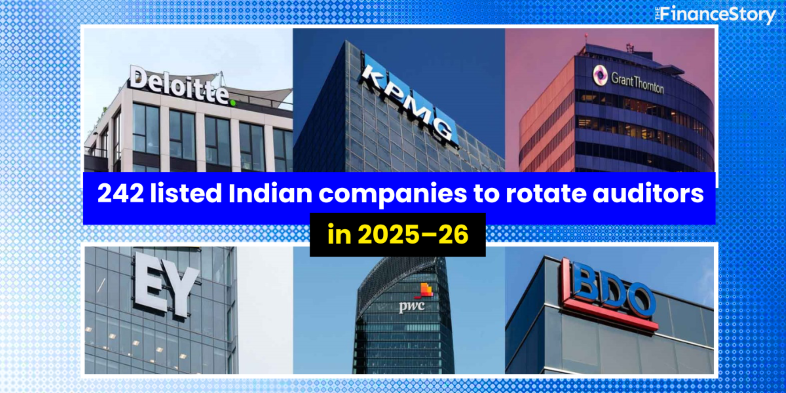- Mandatory audit rotations within Indian listed companies are on the horizon!
- Standalone audit fees for NSE-listed companies reached ₹1,903 crore in FY24–25.
- But here’s the kicker: The Big Four grabbed 29% of that pie.

What’s happening?
The deadline for mandatory auditor rotations is getting closer.
Essentially, India’s audit firms are gearing up for one of the biggest shakeups in the community.
The first cycle of mandatory auditor rotation began around 2017–2018.
And, many large companies will hit their rotation deadlines in 2025–2027.
Rotation of Auditors: What is it, exactly?
To put it simply, it’s more of a regulatory formality that listed companies are required to follow to stay compliant.
Here is a more technical explanation:
According to Section 139(2) of the Companies Act, 2013, certain listed companies in India are required to rotate their auditors after a specified period.
Why?
- To reduce long-term bias or over-familiarity between auditor and client
- Encourage fresh perspectives and increase objectivity
Also read: Auditors big challenge – Rising costs of talent, tech but stagnant audit fees
Big 6 dominates the Indian market
Now here is the kicker…
As of March 31, 2025, affiliates of Big 6 firms – Deloitte, PwC, EY, KPMG, Grant Thornton, and BDO audited 326 of the 483 companies in the Nifty-500 index.
That’s more than two-thirds of all mandates, according to the data from Prime Database.
In total, the Big 6 were responsible for 694 out of 2,069 audits of NSE-listed companies—covering about one-third of the market.
- EY Group tops the charts, auditing 176 companies
- KPMG audited 137 companies
- Deloitte ranks third with it audit of 128 companies
- Grant Thornton Bharat ranks fourth
- BDO’s affiliate MSKA & Associates comes in at fifth position
- This pushes PwC to sixth place in mandate count
Also read: SEBI’s Forensic Audit Panel is here — KPMG, EY, GT out!
How much were the auditors paid?
Unsurprisingly, The Big 4 made a bank.
Standalone audit fees for NSE-listed companies reached ₹1,903 crore in FY24–25, up 9.24% from the previous year.
The Big Four—Deloitte, PwC, EY, and KPMG—captured 29% of that pie.
Deloitte led the pack with audited companies representing 16.19% of NSE’s total market cap, followed closely by EY (15.80%) and KPMG (15.36%).
Rotation ahead: From 2025 to 2029
The audit rotation cycle is about to enter its most intense phase.
Tenures will expire at:
- 242 companies in FY2025–26
- A whopping 957 companies in FY2026–27
- And hundreds more through FY2028–29
That’s over 1,700 potential changes in the next four years!
Companies and auditors gear up
Audit firms are already gearing up to safeguard their turf.
As reported by The Economic Times, Tata Motors has taken an early lead by appointing Deloitte Haskins & Sells LLP as its new auditor starting FY28.
Wrapping up
Although, there is a race to secure the next mandate, some audit firms are not exactly having a field day, when it comes to the fees.
While UK’s FTSE 250 firms saw a sharp 75% increase in audit fees, its Indian counterparts saw a rise of only 25% over the past five years.
Will India catch up?
FAQs
Which companies are required to rotate auditors in India?
Auditor rotation is mandatory for the following classes of companies:
- Listed companies
- Unlisted public companies with: Paid-up share capital ≥ ₹10 crore
- Private companies with: Paid-up share capital ≥ ₹50 crore
Companies with public borrowings from financial institutions, banks, or public deposits ≥ ₹50 crore
How often do auditors have to rotate?
- An individual auditor (CA in practice) can be appointed for a maximum of 1 term of 5 consecutive years.
- An audit firm can be appointed for 2 terms of 5 consecutive years (i.e., 10 years max).
- After completing the maximum tenure, there is a cooling-off period of 5 years before the same auditor/audit firm can be reappointed by the same company.
- Firms within the same audit network (e.g., EY India vs. other EY affiliates) cannot take over each other’s audits during the cooling-off period. This is to prevent a “backdoor” continuation of influence.
What is the audit fee in India?
Audit fees in India are significantly lower compared to those in developed markets like the UK and the US.
Average Audit Fee: In FY2022–23, the average audit fee paid by NSE-listed companies was approximately ₹0.93 crore per company, up from ₹0.91 crore in FY2021–22.
Growth vs. Corporate Performance: Between FY2018 and FY2023, audit fees for Nifty 500 companies grew by 28%, whereas market capitalization increased by 92.75%, net sales by 83.7%, and profit after tax by 126.2%.







